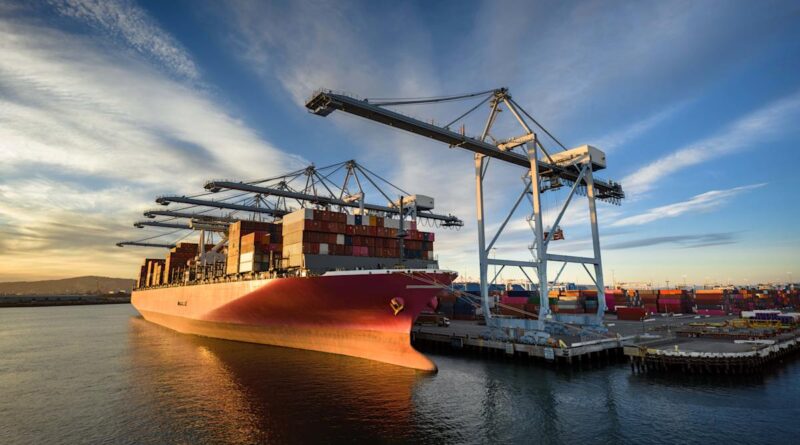Shipping industry’s tariff-fueled decline won’t be ‘short-lived’
00:00 Speaker A
Well, the 10 largest US ports are on track for a striking year-to-year change in container volume, according to McCollum report. Inbound volume fell nearly 8% in June, marking a second straight month of declines as the impact of tariffs grows. For more on the state of the shipping industry, let’s get to Center for Maritime Strategy non-resident senior fellow. That would be John McCollum. John, great to see you on set.
00:31 John McCollum
Thank you. Good to see you.
00:34 Speaker A
So, there was this, there was this good piece I was reading in Bloomberg, John, and it was citing, I believe, your very data, sir. Knowing these kind of trends, the number of shipping containers carrying US imports, what, what are the trends, what are the themes we’re seeing, John?
00:52 John McCollum
Well, there are, there are a real downtrend since the beginning of the year. Um, containers are kind of the count of containers are a timely indicator of, of really economic activity, and, in particular, more recently, it’s been the tariffs. So, containers were down 7.9%, a rather consistent downtrend, and, and this was in June, a consistent downtrend from the beginning of the year. And unfortunately, I think it’s going to get, get worse, you know, as we go forward. And what’s unusual about that is container, container volume has consistently grown at usually well above GDP, some years it was growing two or three times GDP. So we’re really looking at the first year where we’re going to have a year-over-year decline based on my analysis. And we had two-year, two times that occurred before, but they were short-lived right after the financial crisis and during the pandemic. We’re now looking at a rather meaningful reduction, and
02:13 Speaker A
And you, you don’t think, John, it’ll be as short-lived?
02:20 John McCollum
I don’t. But, you know, all of the indications, most particularly with the news on tariffs the last three or four weeks, they seem to be here to stay in this administration. You know, one way or another, not only the tariffs, but there’s something called USTR ship fee program that’ll come into place in October, and that’s kind of a tax on Chinese operated ships and China built ships. And so that’s going to be kind of another form of tariff. Right now, if you look at the value of all the goods coming in over our ports, it’s about 2.2 trillion dollars a year. It’s about 7 and a half percent of our economy. So a reduction in that volume, you know, first has a commerce effect, an effect on growth. And of course, the volume that continues to come in is going to have a much bigger tax. So it’s going to have an inflation effect. I don’t know where it’s going to kind of land on that spectrum, but it’s going to be somewhere that combination of less growth or more inflation. And, and that’s going to be the initial impact, and unfortunately, there really just isn’t a comfortable place on that spectrum, in my view.
04:13 Speaker A
And as you see this decline in inbound volume, John, that means what for consumers?
04:21 John McCollum
Well, for it’s really an indication of consumers will be buying less, you know, less imported goods on their retailer shelf. You know, I think the biggest impact for consumers will be the inflation impact, which, which could be fairly material.
04:57 Speaker A
Can you, are these, are these containers, John, is it, is it, how good a gauge is it of macroeconomic health? Meaning, is there a, is there a relationship between volumes and GDP?
05:18 John McCollum
Yes, there, there consistently has been. It’s kind of a good leading indicator, I think, of economic activity. In the early years, container shipping grew at multiples, but now we’re kind of a little bit above GDP. The investor, Warren Buffett, famously said that his most favorite economic indicator is real car loadings. The notion is that, you know, goods are moved before there’s commerce related to that. So it’s kind of a leading indicator, the Dow theory. I think container volume is really the same thing. Worldwide container volume and, you know, is kind of a measure of worldwide growth, and it’s continuing to grow, you know, even with the US declining, not as much because the US is a big part of that. But I think it’s, for consumers, I think right now, I would think the inflation impact is the most impact. Also, I guess, with, with less imported goods, there’s less choice. There’s less, less, less choice in terms of what to buy. I, I, because I spent my career in container shipping, I’m clearly biased. I think tariffs don’t make any sense, but I think there’s, there’s, there’s economic underpinning. You know, I think the theory of comparative advantage is a beautiful thing that has, you know, I think the US has benefited immensely by trade, not only has our economy benefited, but it’s, it’s, it’s more, provided more national security. You know, IBM famously had an early saying, you know, world peace through world trade. I really believe that. And so, I think as we’re moving away from that sort of open trade, it’s going to first hurt our economy, in my view. Secondarily, it’s concerning in terms of raising tensions.
08:19 Speaker A
Trump trade and terrorists, they dominate today, John. They’re going to keep dominating. We appreciate your time. Thanks for joining us.
08:28 John McCollum
Thank you.
